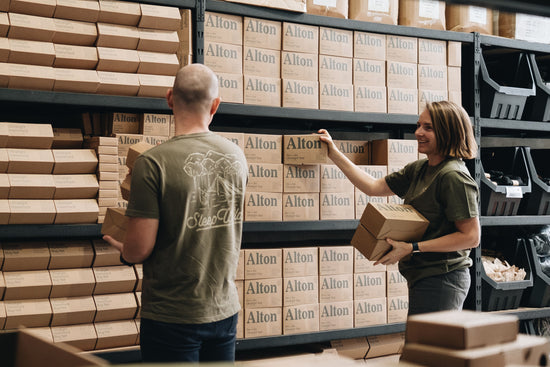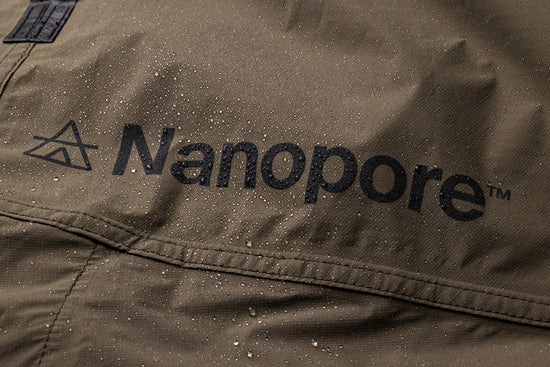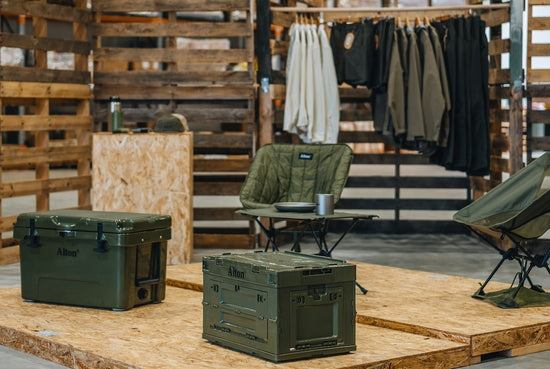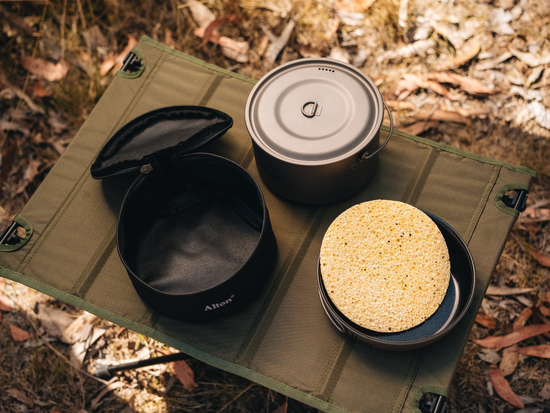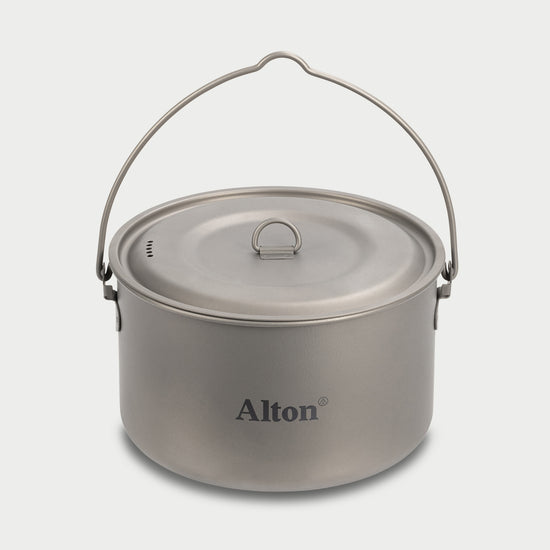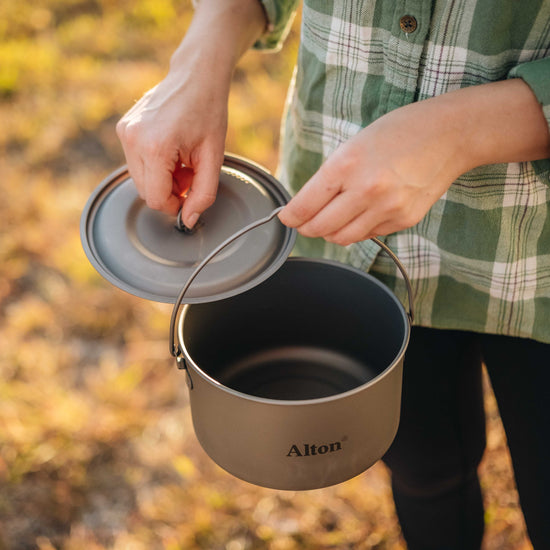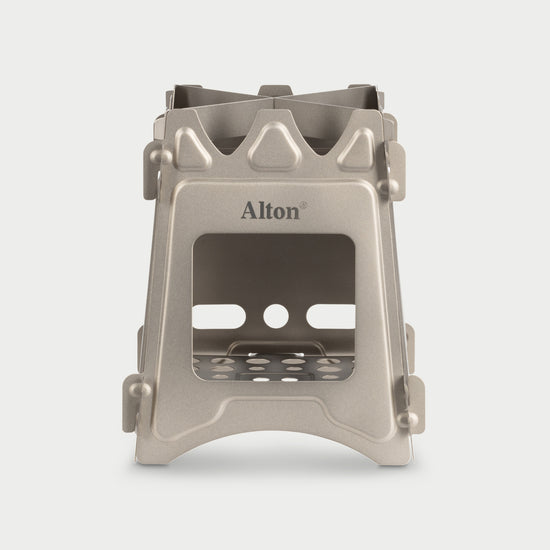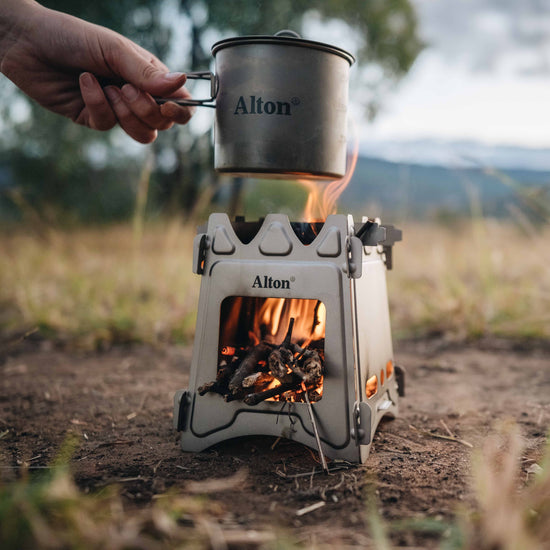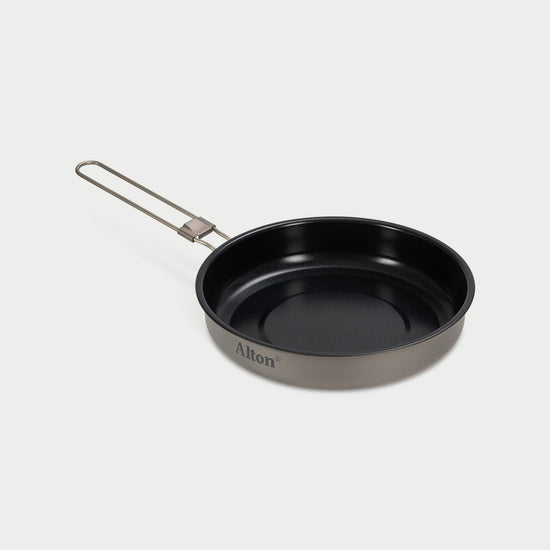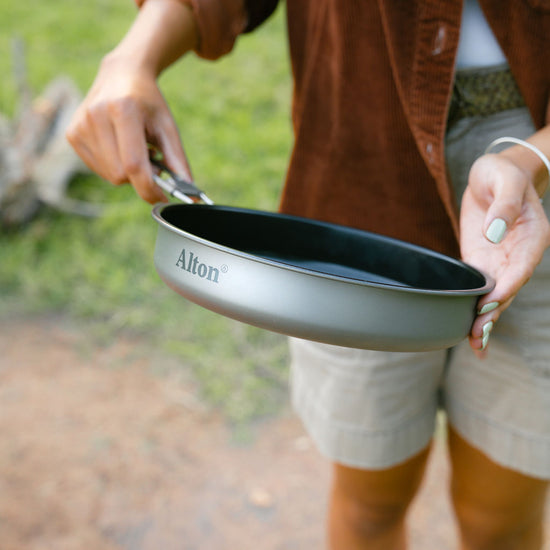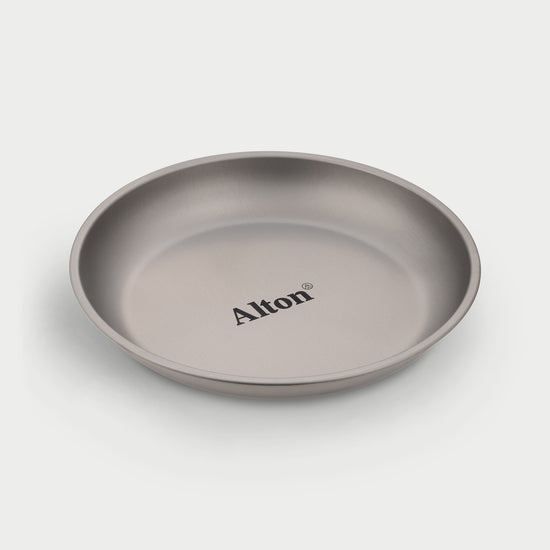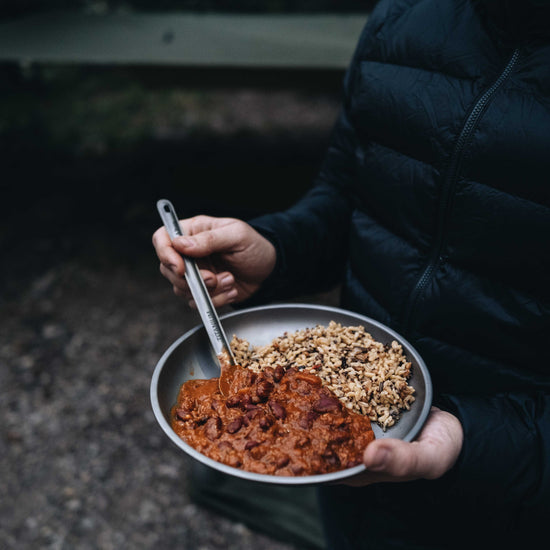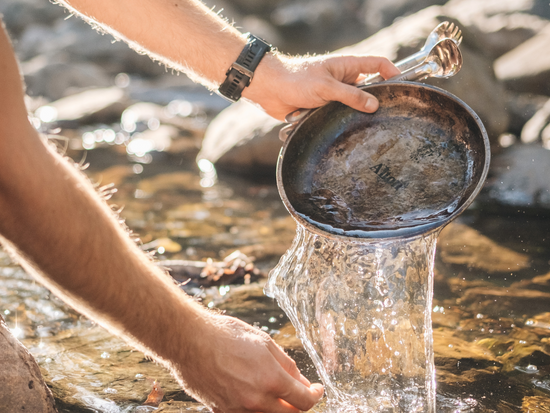All Your Titanium Cookware FAQs Answered: Cooking, Cleaning, Maintenance & More
You might have noticed that we have a bit of a thing for titanium here at Alton HQ.
It all started way back in the early 2000s when Sam got his first titanium camping mug.
It was so light. And so strong. And just so dang practical.
You could say it was love at first sight.
Today, that passion for titanium camping cookware has turned into a full-blown obsession – we’re proud to be one of Australia's top producers of high-quality titanium cookware.
In this blog, we’re diving into all your burning questions about titanium camping cookware. We’ll talk cooking, cleaning, maintenance, storage and more so you can get the best out of your titanium cookware.
Ready? Let’s get down to business.
General Titanium FAQs
Why is titanium cookware so popular for camping?
Titanium cookware is popular for camping for a few key reasons:

Which is better, aluminium, stainless steel, or titanium?
Like we always say, there is no such thing as ‘best’ when it comes to hiking gear. There is only what best meets your specific needs in a specific situation.
With that in mind, here is the lowdown on aluminium, stainless steel, or titanium camping cookware:
Aluminium Camping Cookware
Aluminium camp cookware is light and offers great heat conductivity. It’s also generally the most budget-friendly option among the three materials. However, it is more susceptible to damage – and damaged aluminium cookware may leach particles of the metal into your food, particularly if you’re cooking with acidic foods like tomatoes, citrus or vinegar. This means you’ll need to replace it more frequently, so you may end up spending more over the long run compared to titanium or stainless steel camping cookware.
Stainless Steel Camping Cookware
Stainless steel camping cookware is super durable, offers excellent corrosion resistance and provides reliable cooking performance. That said, it’s heavy. Stainless steel camp cookware will typically weigh more than both aluminium and titanium options, so it may not be the best choice if you're trying to go ultralight. But, if you’re not concerned about weight, then stainless steel might be a great choice for you.
Titanium Camping Cookware
Titanium cookware offers an unbeatable weight-to-strength ratio, meaning it is both incredibly lightweight and insanely durable. This means titanium cookware can last forever - it’s extremely resistant to damage from corrosion and can withstand extreme heat up to 1,600°C with no risk of degradation. Another big plus is that it’s non-toxic and non-reactive. But, while titanium cookware offers elite level performance, it is more expensive. Another downside to titanium is that it can be a bit trickier to cook with because it is prone to hotspots.
The final verdict…
- Aluminium is effective and budget-friendly up front, but it will need replacing more often.
- Stainless steel shines (pun intended) as a good all-rounder, but it’s not the lightest option.
- Titanium is ultralight, ultra-durable and 100% non-toxic, but it isn’t cheap.

What are the disadvantages of titanium cookware?
We think titanium cookware is awesome… but that doesn’t mean it’s perfect.
Here are the main disadvantages of titanium cookware:
Why is titanium expensive?
We all know titanium is more expensive. But why?
Well, there are a few reasons:
Is titanium camping gear worth it?
We’ve come up with a quiz to help you determine whether titanium cookware is worth it to you:
- How often do you go camping?
b) A few times a year, but I wish it was more often.
c) Rarely… it’s just so hard to find the time.
- What is your camping style?
b) I prefer fun, laid back trips - but I’m also up for a challenge now and then!
c) I’m here to take it easy and hang with mates.
- How important is the weight of your gear?
b) Somewhat important.
c) Not important.
- What’s your approach to camp cooking?
b) Those dehydrated meals are gross. I prefer to cook real food when I’m camping.
c) Food is life! I like to get creative with my camp cooking.
- What’s your budget?
b) I’m looking for good value – price and performance are both important to me.
c) I’ll take the cheapest option, thanks!
RESULTS…
Mostly A’s: You’re a serious adventurer who practically lives in the wild, so having ultralight, durable and corrosion-resistant titanium cookware will be well worth the investment.
Mostly B’s: You enjoy a good adventure, but you’re not hardcore about it… yet. Having titanium cookware might still be worth it for you because it will last you forever and perform well across a variety of conditions.
Mostly C’s: You enjoy camping now and then, but you like your creature comforts… and your car… to be close by. Titanium cookware is probably overkill for your needs – stainless steel or aluminium will probably do the job.

Cooking FAQs
Is titanium cookware food safe?
Titanium is considered to be one of the safest metals for cookware because it is non-toxic and non-reactive. This means it will not chemically interact with foods or leach harmful substances into your cooking.
The non-reactive properties of titanium cookware also helps prevent it from developing any weird odours and funky aftertastes with frequent use (provided that you clean it properly).
Is titanium cookware hard to cook with?
Titanium camping cookware does have a bit of a reputation for being a bit tricky to cook with. There are four main reasons why this is the case:
Can I use titanium cookware over a campfire?
Yes, most titanium cookware can be used over a campfire. Still, we’d recommend you check the manufacturer’s care advice first before you try.
Here at Alton, we like to use a camping grill or hangers to suspend our titanium cookware above the coals. This method gives you more control over the temperature and helps prevent your food from burning.
Can a campfire melt titanium?
Titanium has an extremely high melting point (up to 1,600ºC) and your campfire won’t even come close to that. So no, a campfire can’t melt titanium.
But be careful, if your titanium cookware has added components such as silicone handle covers, these can definitely melt or be damaged by use over a campfire.
Will my titanium cookware warp with heat?
Titanium cookware is resistant to warping, but it's still important to use it properly.
For example, you probably will cause your titanium pot to warp if you place it on the coals of your campfire directly without anything inside it, or if you dunk it in cold water while it is still searing hot.
Can I use metal utensils on titanium pots and pans?
The standard advice out there is to NOT use metal utensils on titanium camping cookware.
Titanium is extremely durable, but it is not the hardest metal (yes, there is a difference). This means it can still get scratched if you use metal utensils on it.
A few scratches and marks won’t significantly impact functionality, but we’d personally prefer to keep our titanium pots and pans in good nick, thanks.

Cleaning FAQs
How do you clean titanium camping cookware?
We have an entire blog about how to clean your titanium camping cookware – you can read it here.
Titanium is fairly easy to clean. In most cases, a gentle scrub with a non-scratch sponge and some warm soapy water will do the trick.
However, if you’ve got a real mess on your hands, you can try filling the pot with soap water and bringing it to the boil. This helps loosen any food residue, making it easier to clean.
If you’re struggling with persistent food residue or notice that your titanium cookware has a funky smell to it, try the baking soda paste method. Simply combine 1:1 of baking soda and water to form a paste, then spread this over the pot and leave for at least 15-20 minutes. Then use a non-scratch scouring pad to scrub again before washing as normal with soapy water.
Can I put my titanium cookware in the dishwasher?
Titanium cookware is generally considered dishwasher safe, but we still prefer to wash it by hand.
Dishwashing detergents usually have caustic chemicals that can cause damage to some metals. However, because titanium is so resistant to damage from corrosion, this generally won’t be a problem.
That said, because many manufacturers advise against washing titanium camp cookware in the dishwasher, it is important to check and follow any specific advice they provide.
Can I use an abrasive sponge or metal scourer on my titanium cookware?
We recommend using non-scratch scourers or sponges on your titanium cookware. Titanium is pretty tough, so a mildly abrasive pad will usually be fine… but steel wool or a heavy-duty scouring pad may scratch the titanium.
How do you remove tarnish from titanium?
Tarnish is pretty common on titanium camping cookware. We personally quite like the well-used look that comes from taking your titanium cookware on many adventures.
But, if you do want to give your titanium pot a bit of a refresh, the baking soda method works the best in our experience (you can find instructions for it here).
Maintenance & Storage FAQs
Will titanium rust with water?
Nope! Titanium is resistant to rust and corrosion of all kinds. Still, we recommend thoroughly drying your titanium after washing it and storing it in a dry place so it is not exposed to water for a prolonged period of time.
My titanium cookware is discoloured after using it – is that normal?
Yes, it is normal.
Rainbow discolouration occurs when you expose the metal to heat and oxygen, building up an oxidised layer that refracts the light differently. This is why you may see some green, blue, yellow and purple colours where the titanium was in contact with the heat source.
A black carbon build up on the outside of the pot is also common, especially if you’re using your titanium cookware over campfires. Washing can help remove some of the sooty residue, but the metal may stay black where the surface has formed an oxidised layer.
The discolouration is not harmful and does not impact the performance of your titanium cookware. Cooking over lower heats or only using your titanium pot to boil liquids can help prevent this from occurring.
Does titanium cookware scratch more than stainless steel?
It depends. The purer the titanium, the softer it is. So, in some cases, high-grade titanium may be more susceptible to superficial scratches than stainless steel.
But remember, neither metal is completely indestructible. They’re both going to get scratched, dinged or bent if you try hard enough.
Our advice? Treat your cookware with care, whatever metal it’s made from.
How should I store my titanium camping cookware?
We recommend storing your titanium camping cookware in a dry, well-ventilated place when you’re not using it – and always make sure it’s completely dry before you pack it away.
On the trail, we like to keep our titanium camping cookware sets in dedicated storage bags, such as a pot pouch. This prevents any soot left on the outside of the pot from getting onto our other gear and helps keep everything organised.
That’s all your titanium FAQs answered!
Phew, you made it! There was a lot to cover there, but now you know everything about how to use, clean and care for your titanium cookware.
Still got questions? We’re here to help. If you ever have any questions about our range of titanium goods or anything else we make, just get in touch.
